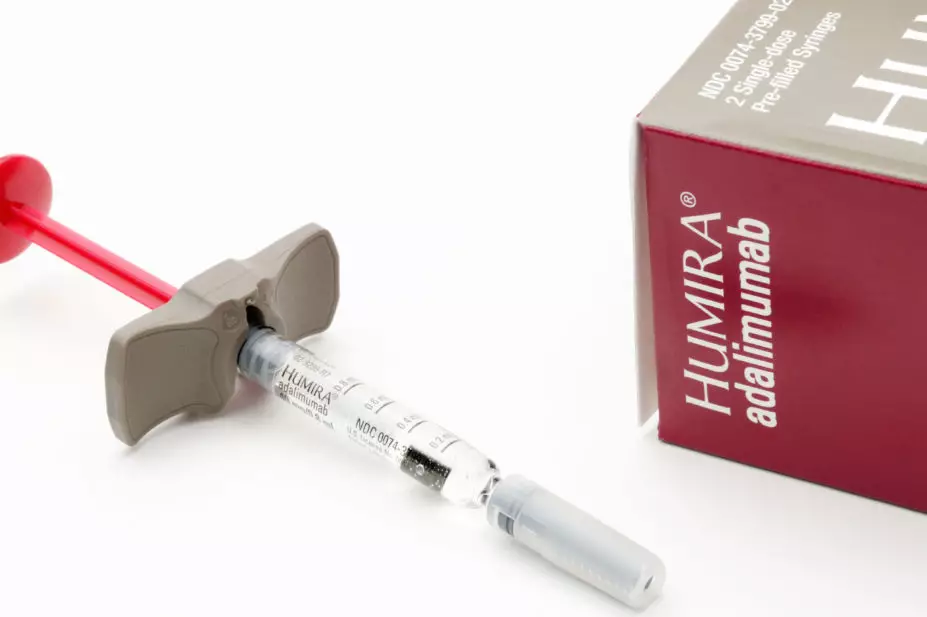
Martin Shields / Alamy Stock Photo
More than half of people with immune-mediated inflammatory diseases who were switched from Humira (adalimumab; AbbVie) to biosimilar adalimumab say they were not asked for their consent prior to the switch, a study has found.
The survey, carried out by several UK patient organisations and published in the BMJ on 16 February 2022, found that among 899 patients switched from branded adalimumab Humira (Abbvie) to a biosimilar, 53% reported not being asked for consent before switching and 56% said they were not given an option to decline the switch.
The web-based survey was anonymised and designed to investigate the experiences of people with specific immune-mediated inflammatory diseases during the process of switching from biologic originator Humira to biosimilar adalimumab, the majority of whom were patients with Crohn’s disease and rheumatoid arthritis or juvenile idiopathic arthritis.
Overall, 34% of respondents reported that they were “not at all satisfied” with their biosimilar adalimumab after the switch and only 8% were “very satisfied”.
Dissatisfaction was associated with complaints related to the switching process, including lack of shared decision making, scarcity of information provided by the department instigating the switch and lack of training with the new injection device.
After switching from Humira to the biosimilar adalimumab, 51% said that the injection pain was “much worse”, while 23% said it was “slightly worse”.
However, in cases where training with the new device had been provided, respondents reported a significant reduction in pain levels (odds ratio [OR] 0.20, 95% confidence interval [CI] 0.07 to 0.55). These individuals also reported reductions in side effects (OR 0.17 95% CI 0.06 to 0.47) and difficulty in using the new injection device (OR 0.25 95% CI 0.15 to 0.41).
The survey was carried out jointly by four national patient organisations: the National Rheumatoid Arthritis Society (NRAS), National Axial Spondyloarthritis Society, Crohn’s and Colitis UK and Psoriasis Association.
Ailsa Bosworth, national patient champion for NRAS, said that the survey findings “unequivocally” highlighted the importance of the provision of using clear patient information about the switch to biosimilars, as well as appropriate training in the use of a new injection device.
“The clear consequence of this best practice is a reduction in patient-reported side effects and injection-related pain, as well as improved ease of using the injection device and reduction in any negative perceptions regarding symptom control with the new biosimilar,” she added.
“We hope this study will raise awareness of, and highlight the need for, implementing the principles of shared decision making when it comes to moving any patient to a new treatment.”
Responding to the survey results, Kalveer Flora, lead rheumatology and biosimilars specialist pharmacist at London North West University Healthcare NHS Trust and chair of Rheumatology Pharmacists UK, said that whenever conducting a biosimilar switch or changing a medication it was important that it was conducted in a structured way enabling the patient to ask questions.
She added: “We know biosimilars have equivalent safety and efficacy data to the originator molecule as we have a wealth of evidence. We also know that when teams engage with specialist pharmacists to help facilitate a biosimilar switch, they are more successful.
“It is important to also mention the nocebo effect here and this has an impact on what patients feel about switching. This can be prevented by providing clear information and a point of contact to speak to.”
According to data published in 2019, an NHS programme to switch patients to an adalimumab biosimilar resulted in savings of more than £109m in the 2018/2019 financial year.
Adalimumab was previously a medicine on which NHS hospitals spent more than £400m per year.
Read more: Preparing for the big biologic switch
2 comments
You must be logged in to post a comment.


The study acknowledges the limited conclusions that can be drawn from this - likely selection bias for people with negative views, with many complaining that the device was harder to use (variable depending on biosimilar) or pain at injection site. We don't have denominator for how many people were contacted - was it a silent majority?
Much was made by originator company of their product being citrate-free and therefore less painful to inject, yet for many years it had contained citrate. That must have had an impact on patient perceptions.
The pressure to deliver the switch and the top-down decisions about what biosimilars were allocated to each area didn't make things easier either. There certainly wasn't the time to bring in every patient for face-to-face discussions (as was common pre-Covid).
The lessons we can draw are limited, except to say that people who felt they had enough information were less likely to complain.
Completely agree James. We switched all our patients in gastro to the citrate containing first line biosimilar. Currently only 10% of our patients are using a non-citrate biosimilar or originator having switch back/forward again after failing to tolerate the citrate biosimilar post switch. It's clearly a relevant factor, but the numbers are completely out of step with those of this study, suggesting there is bias at play.